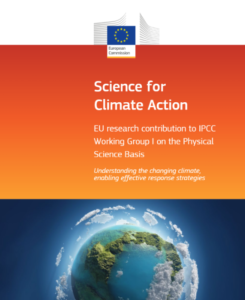Scientific research undertakes a vital role in addressing Climate Change threat by generating consensus, bringing positions together and offering response options. The Intergovernmental Panel on Climate Change (IPCC) is the authoritative institution within the science-policy interface of global climate governance. It is currently finalising its seminal 6th Assessment Report, with contributions from the three working groups published in 2021 and 2022.

The IPCC is responsible for providing policymakers with systematic, comprehensive, and authoritative scientific assessments of climate science knowledge, building on the work of hundreds of scientists worldwide. Consecutive reports have seen an increased conviction on the findings, based on systematic progress in climate science and modelling, and have reinforced the warnings and calls for action. The IPCC reports thus represent an essential source of information for the application of the Paris Agreement.
The new brochure report highlight and acknowledges the contribution of EU-funded projects to the physical science behind the changing climate as addressed by the IPCC Working Group I. It provides examples of outstanding projects financed by the European Commission and aims to improve the general conception of how the climate system works, and how it is changing in response to human activity, providing a basis for more effective responses. The topics discussed on the report, range from the functioning of the carbon cycle and assessments of carbon budgets, through modelling of Earth System processes, improving climate forecasts and projections, exploring the impacts of Arctic warming and extreme events up to evaluating probability and proximity of climate tipping points.
The latest IPCC 6th Assessment Report (AR6) consists of three parts. The first section, centres on climate change physical science. The second part, approved in February 2022, warns that any further delay in climate action “will miss a brief and rapidly closing window of opportunity to secure a liveable and sustainable future for all”. The third report discusses mitigation and highlights how the world must take deep and rapid cuts in emissions to keep global warming in check. The final and synthesis report concluding the 6th Assessment Cycle, is expected to be launched in March 2023.
It should also be noted, that The European Union Funding has contributed for approximately 12% of all references cited. EU-backed projects play a key role in rising public support for more ambitious climate action through a variety of outreach activities.
Click here to access and read full report.





